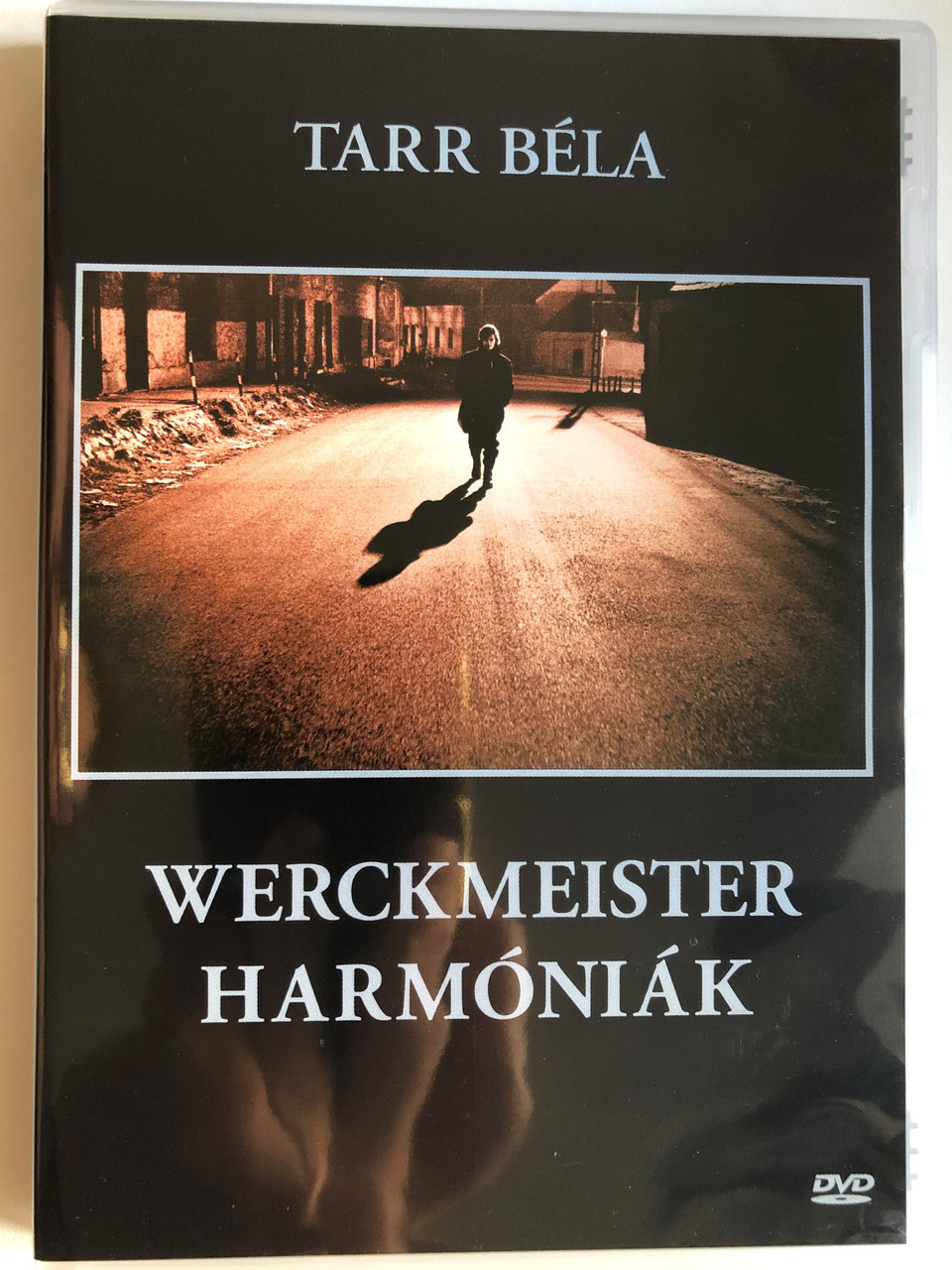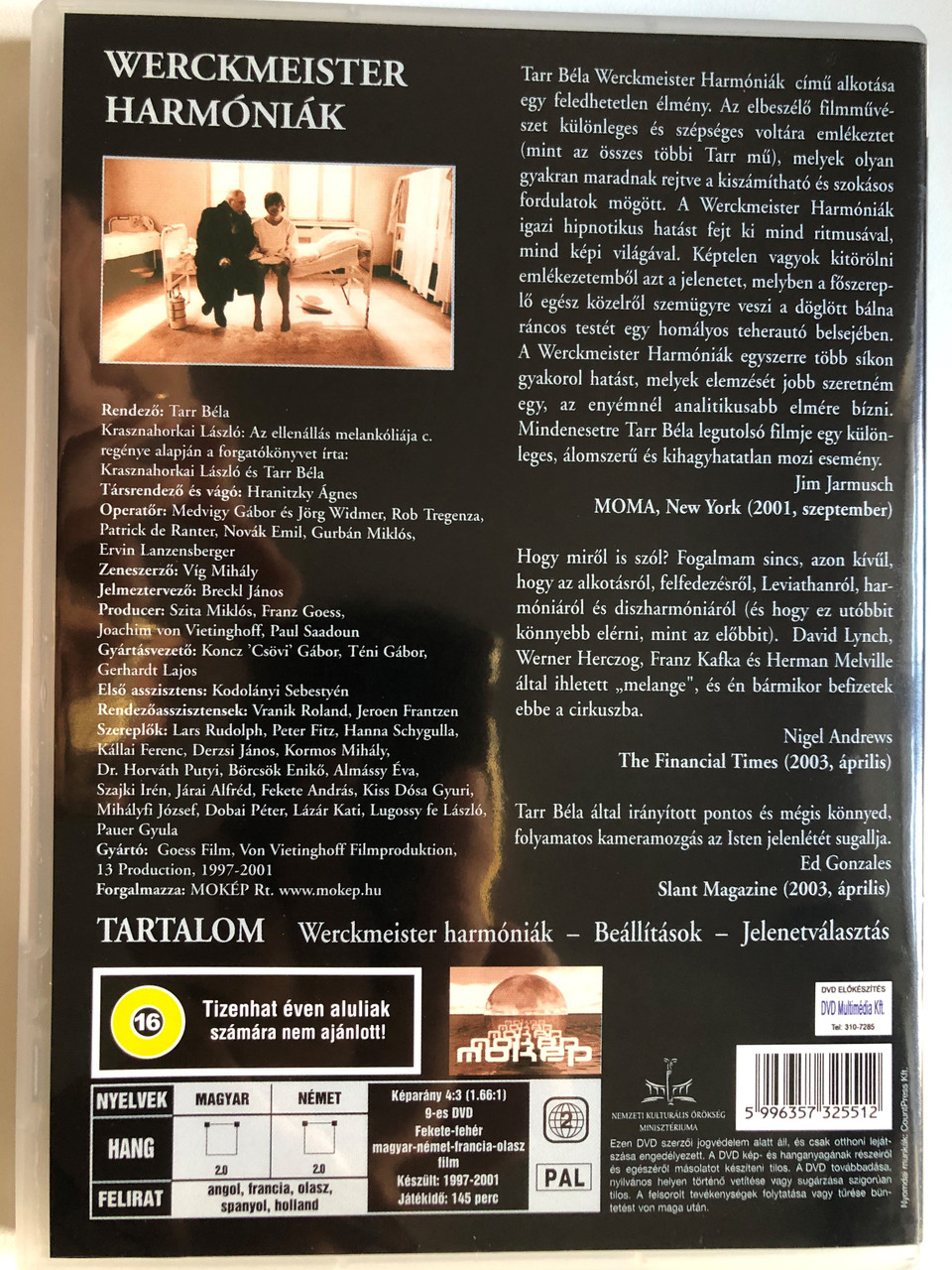Description
Werckmeister harmóniák DVD 2000 Werckmeister Harmonies / Director: Tarr Béla / Szereplõk: Lars Rudolph, Peter Fitz, Kállai Ferenc, Derzsi János, Börcsök Enikõ, Almássy Éva / Les Harmonies Werckmeister
UPC 5996357325512
Made in Hungary
REGION 2 PAL DVD
Audio: Hungarian, German
Subtitles: English, French, Dutch, Spanish, Italian
Werckmeister Harmonies (pronounced [verkˈmaɪ̯stɐ]; Hungarian: Werckmeister harmóniák) is a 2000 Hungarian drama film directed by Béla Tarr and Ágnes Hranitzky, based on the 1989 novel The Melancholy of Resistance by László Krasznahorkai. Shot in black-and-white and composed of thirty-nine languidly paced shots, the film shows János and his uncle György during the communist Hungarian era. It also shows their journey among helpless citizens as a dark circus comes to town casting an eclipse over their lives.
The title refers to the baroque musical theorist Andreas Werckmeister. György Eszter, a major character in the film, gives a monologue propounding a theory that Werckmeister's harmonic principles are responsible for aesthetic and philosophical problems in all music since, and need to be undone by a new theory of tuning and harmony.
Werckmeister Harmonies opened to wide acclaim from film critics, and has come to be regarded by many critics as one of the best films of the 2000s, ranking 58th on a 2016 BBC poll of the best films since 2000.
Cast:
- Lars Rudolph as János Valuska
- Peter Fitz as György Eszter
- Hanna Schygulla as Tünde Eszter
- János Derzsi as the Man In The Broad-Cloth Coat
- Đoko Rosić as the Man In Western Boots
- Tamás Wichmann as the Man In The Sailor-Cap
- Ferenc Kállai as the Circus Master
- Péter Dobai as the Police Captain
Megjelent DVDn: 2005.12.15
Mûfaj: Dráma
Rendezte: Tarr Béla
Szereplõk: Lars Rudolph, Peter Fitz, Kállai Ferenc, Derzsi János, Börcsök Enikõ, Almássy Éva
Forgalmazó: Mokép
Feliratok: Angol, Francia, Holland, Spanyol, Olasz
Hang:
Magyar - Dolby Surround
Német - Dolby Surround
Képformátum: 4:3 - 1.66:1
Hossz: 145 perc
Tarr Béla Werckmeister harmóniák című alkotása feledhetetlen élmény. Az elbeszélő filmművészet különleges és szépséges voltára emlékeztet (mint az összes többi Tarr mű), melyek olyan gyakran maradnak rejtve a kiszámítható és szokásos fordulatok mögött.
A történet egy magyar alföldi kisvárosban játszódik. Csikorgó, igaz hideg van – hó nélkül. Több százan állnak a fõtéren felállított cirkuszi sátor elõtt, hogy végre megláthassák a nagy szenzációt, egy bálna kitömött tetemét. Jönnek mindenfelõl. A környezõ tanyákról, az Alföld különbözõ zugaiból és az ország egészen távoli vidékeirõl is.
Néma, arctalan, rongyokba burkolódzó tömeg követi az otromba szörnyet. Ez a furcsa állapot – az idegenek megjelenése és a farkasordító hideg – megzavarja a kisváros békésnek amúgy sem nevezhetõ rendjét. Az emberi viszonyok felborulnak, a történet ambiciózus szereplõi úgy érzik, kihasználhatják a helyzetet, az amúgy is passzivitásra ítélt emberek pedig még nagyobb bizonytalanságba zuhannak.
Az elviselhetetlenségig fokozódó feszültséget a bálna mögött lapuló, arctalanságba burkolódzó Herceg figurája robbantja fel. Puszta megjelenése is elegendõ ahhoz, hogy elszabaduljanak a gyilkos indulatok.
Extrák:
Interaktív menük
Jelenetek közvetlen elérése
- Gyártási év: 2000
- Megjelenés éve: 2005
- Hossz: 145 perc
- Rendezte: Tarr Béla
- Szereplők: Peter Fitz, Lars Rudolph
- Forgatókönyv: Krasznahorkai László, Tarr Béla
- Zene: Víg Mihály
- Fényképezte: Patrick De Ranter, Gurbán Miklós
- Vágó: Hranitzky Ágnes
- Hangsávok: magyar - Dolby Digital 2.0
- Feliratok: angol, francia, holland, olasz, spanyol
- Gyártó stúdió: MMKA, Arte, MTV
- Képformátum: 16:9
- Extrák: interaktív menü - közvetlen jelenetválasztás
Un mystérieux cirque est installé sur la grande place où la foule muette se rassemble.
Valushka court sous un ciel de plomb, le vent souffle, on est en novembre et c'est déjà l'hiver, le brouillard se répand, plus épais que jamais, la lumière est glacée, brutale, irréelle, les rues couvertes de détritus, les immeubles délabrés, des vitrines ont été brisées ; plus de médecins, plus d'écoles, l'heure du Jugement dernier serait-elle arrivée ?
It is set in an anonymous, desolate, isolated small town in Hungary during Communist times.
The film starts with János Valuska, a young newspaper-delivery man, conducting a poem and dance with drunken bar patrons. The dance is of the total eclipse of the sun, which disturbs, then silences the animals. It finishes with the grand return of the warm sunlight.
János is devoted to his uncle György, a composer and musicologist, who is like a father to him. György records his observations about the imperfection and compromise of the musical scale, as defined by Andreas Werckmeister. György proposes changes to the scale to make its harmonies more natural.
János goes to the post office to pick up his newspapers for delivery. The workers are unsettled by the ominous signs of the circus' arrival and are disturbed by the cloud that settles over each town it visits.
A “circus” built around a huge stuffed smelly whale and its star performer, "The Prince", who is never seen, come to town in the silence and darkness of night. János sees them arrive and philosophizes about God and the whale.
György's estranged wife, Tünde, tries to leverage her political and social status by giving György a list of names to recruit for the "Clean Up the Town movement," with the blessing of the police chief, and demands that György become chairman of the movement, or else she will move back in with him that very evening. She sends her suitcase ahead of her with János. György's struggling cobbler brother, Uncle Lajós, gets the list and passes it on to the agitated throbbing masses in the town square who are unhappy with the failing public services. János is accosted by a thug in front of the open truck housing the whale. Tünde sleeps with the drunk gun-toting police chief.
The presence of the whale and the “Prince” stir up the masses. János overhears the circus master losing control of his faceless Prince, who is becoming drunk with his own voice of revolutionary dogma. The circus master disowns him. The Prince, now free, inflames the masses, and the people riot. The rioters are brutal. The rioters, holding clubs, march, then run, into a psychiatric hospital where dissidents opposing the regime are kept, drag them out of their beds and beat them. When the rioters finally find a helpless old naked patient, who is all skin and bones, and who looks like a “musulman” in a Nazi concentration camp, they see their impotent, sad and powerless selves and withdraw silently.
After the riot, János comes across the diary of a rioter. It explains that the rioters did not know what they were angry with; so they were angry at everything. Then it recounts the mob's horrendous rape of two post-office girls.
János comes across his killed cobbler uncle Lajós, who got naively involved in the riot. János is told, by this cobbler's wife, to leave town at once for his own safety, as his name was on a list held by the rioters.
János runs away on the railroad tracks but is intercepted by a helicopter. He finds himself committed to a mental institution with caged beds (a tool of the time for dealing with political dissidents). János appears drugged and broken.
György, his composer uncle, is evicted from their house but gets to live in a shed in the garden whilst György's former wife, Tünde, with her new status as a collaborator, now occupies the big house with the police chief.
György tells a vacant János, in the ward, that if he is released from the mental institution they can live contentedly together in the shed with his piano. György also mentions that he has re-tuned the piano so that is now like any other, a personal capitulation apparently abandoning any present hopes of reform. János just stares.
The film ends with György looking directly into the eye of the whale, then, walking away and looking back at the now sad and disheveled whale, whose “circus” was destroyed by the rioters the night before, its rotting carcass slowly enveloped by the fog which gets whiter and brighter. Warm bright sunlight returns.
Spanish Description:
Werckmeister Harmóniák es una película dramática y de misterio húngara dirigida por Béla Tarr y Ágnes Hranitzky del año 2000, basada en la novela de 1989 La melancolía de la resistencia de László Krasznahorkai. Filmada en blanco y negro y compuesta por treinta y nueve tomas de ritmo lánguido, la película muestra a János y su amigo mayor György durante la era comunista húngara. También muestra su viaje entre los ciudadanos indefensos mientras un circo oscuro llega a la ciudad lanzando un eclipse sobre sus vidas.
El título hace referencia al teórico musical barroco Andreas Werckmeister. György Eszter, uno de los personajes principales de la película, presenta un monólogo que propone una teoría según la cual los principios armónicos de Werckmeister son responsables de los problemas estéticos y filosóficos en toda la música desde entonces, y deben deshacerse con una nueva teoría de afinación y armonía.
Werckmeister Harmonies recibió la aclamación universal de la crítica de cine y, a menudo, figura entre las principales obras cinematográficas del siglo XXI. En una encuesta realizada por la BBC en 2016, la película fue catalogada como una de las 100 mejores películas desde 2000 (56.ª posición).
| Directed by | Béla Tarr Ágnes Hranitzky |
|---|---|
| Screenplay by | László Krasznahorkai Béla Tarr |
| Based on | The Melancholy of Resistance by László Krasznahorkai |
| Produced by | Béla Tarr |
| Starring | Lars Rudolph Peter Fitz Hanna Schygulla |
| Cinematography |
|
| Edited by | Ágnes Hranitzky |
| Music by | Mihály Vig |
|
Release date
|
|
|
Running time
|
145 minutes |



























